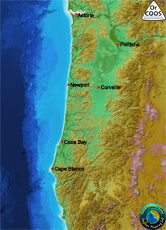Project: Collaborative Research: Autonomous pH and Alkalinity Sensors: in situ Testing and Carbon Cycle Research
Description
The earth's carbon cycle has been dramatically altered by global human industrialization. The movement of carbon from ancient fossil deposits to the atmosphere and into marine and terrestrial biospheres has many consequences, few of which are currently fully understood or predictable. Much of the needed understanding of the carbon cycle may come from better observational methods that can characterize large spans of time or space. One group of observational methods, autonomous sensors, can provide high temporal resolution data within air, earth or water systems. In this research, PIs from the University of Montana, Oregon State University and University of Miami will develop and use autonomous sensors to advance our understanding of carbon cycling within the earth's biosphere. With prior support, they have developed sensors for the partial pressure of CO2 (pCO2), pH and total alkalinity that can be used to quantify the amount of dissolved inorganic carbon through thermodynamic relationships. The more recently developed, currently laboratory-based sensors (pH and alkalinity) will be further refined for subsequent deployment, along with the more mature pCO2 sensor, in two contrasting marine environments; the coastal ocean waters off the U.S. central west coast, and a shallow coral ecosystem in Puerto Rico. Field studies will begin with a short, in situ test off Oregon State University's pier in Newport, Oregon followed by deployment on the Oregon shelf to study the processes that control air-sea carbon dioxide fluxes during periods of coastal upwelling. Concurrently, the same sensors will be deployed in La Parguera Marine Reserve, Puerto Rico, a Coral Reef Early Warning System (CREWS) site operated by NOAA to focus on the relationship of calcium carbonate saturation states to calcification rates in a coral reef ecosystem.
The project will have a number of broad impacts including the technological development of rigorously tested sensors that will have a wide range of applications in marine and freshwater research. Students will be trained in the area of chemical sensor development who will subsequently become the next generation of leaders in this important research area. Outreach activities related to the grant will create awareness for contemporary carbon cycle issues such as greenhouse gas warming and ocean acidification.
PUBLICATIONS PRODUCED AS A RESULT OF THIS RESEARCH
Note: When clicking on a Digital Object Identifier (DOI) number, you will be taken to an external site maintained by the publisher. Some full text articles may not yet be available without a charge during the embargo (administrative interval).
Some links on this page may take you to non-federal websites. Their policies may differ from this site.
Edson, JB; Degrandpre, MD; Frew, N; McGillis, WR. "Investigations of Air-Sea Gas Exchange in the CoOP Coastal Air-Sea Chemical Exchange Project," OCEANOGRAPHY, v.21, 2008, p. 34. View record at Web of Science
Hamme, R.C., Webley, P.W., Crawford, W.R., Whitney, F.A., DeGrandpre, M.D., Emerson, S.R., Eriksen, C.C., Giesbrecht, K.E., Gower, J.F.R., Kavanaugh, M.T., Peña, M.A., Sabine, C.L., Batten, S.D., Coogan, L.A., Grundle, D.S., and D. Lockwood. "Volcanic ash fuels anomalous plankton bloom in subarctic Northeast Pacific," Geophysical Research Letters, v.37, 2010, p. L19604. doi:10.1029/2010GL044629
Byrne, R.H., DeGrandpre, M.D., Short, R.T., Martz, T.R., Merlivat, L., McNeil, C., Sayles, F.L., Bell, R. and P. Fietzek. "Sensors and systems for observation of marine CO2 system variables," Proceedings for Ocean Obs â??09, 2010.
BOOKS/ONE TIME PROCEEDING
Cullison, S.E.. "MARINE APPLICATIONS OF AN
AUTONOMOUS INDICATOR-BASED pH
SENSOR", 10/01/2009-09/30/2010, 2010, "The University of Montana".
| Dataset | Latest Version Date | Current State |
|---|---|---|
| pCO2, pH, salinity and temperature data collected off the coast of Oregon, USA by a SAMI-CO2 sensor on the Shelf Break Mooring located below the National Data Buoy Center?s meteorological Buoy 46050; 2007-2011 (NH10_ShelfBreak_MLR project) | 2016-01-12 | Final no updates expected |
| SAMI-CO2, SAMI-pH, temperature and dissolved oxygen from multiple moorings near Media Luna Reef, Puerto Rico from 2007-2008 (DOGEE-II project, NH10_ShelfBreak_MLR project) | 2016-01-12 | Final no updates expected |

